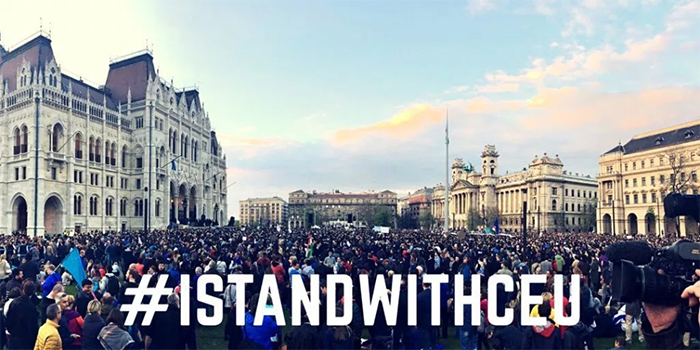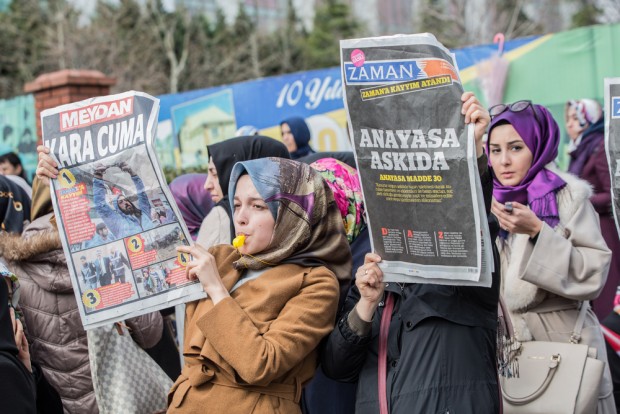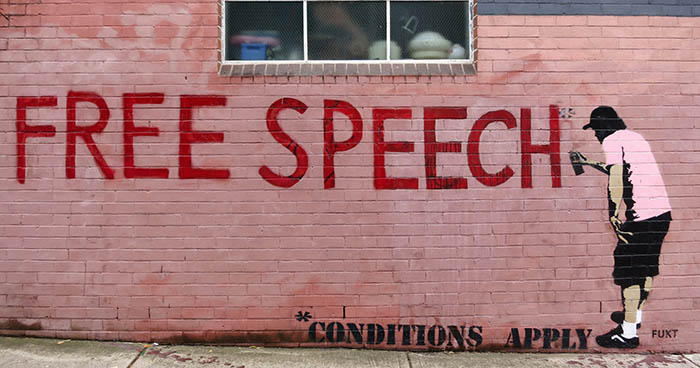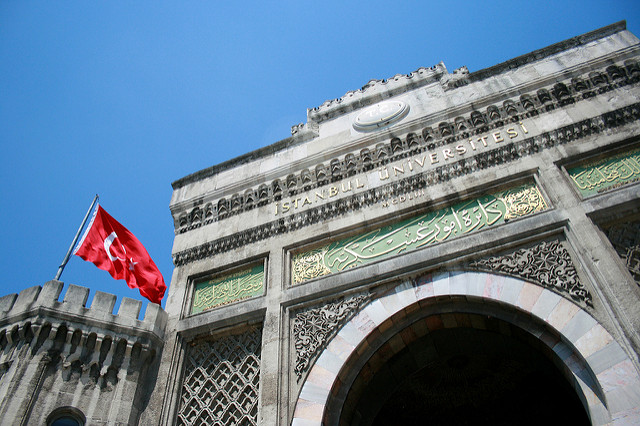25 Apr 2017 | Academic Freedom, Hungary, News
[vc_row][vc_column][vc_column_text]
As a new law passed by Hungarian prime minister Viktor Orbán’s government threatens the existence of Central European University in Budapest, 70,000 people marched in protest in the capital to save it as part of the #IStandWithCEU campaign.
Among those offering supportto protect the academic freedom of one of central Europe’s most prominent graduate universities, either by writing letters or demonstrating, include more than 20 Nobel Laureates including Mario Vargas Llosa, hundreds of academics worldwide, the European Commission, the UN, the governments of France and Germany, 11 US Senators, Noam Chomsky and Kofi Annan.
Whilst the amendment, which will effectively force CEU to shut, has been signed into statute by Hungarian president Janos Ader, the university hopes to challenge the law in the Hungary’s Constitutional Court.
In a video released on 20 April, Michael Ignatieff, president and rector of CEU, said: “Three weeks ago this university was attacked by a government who tabled legislation that would effectively shut us down. We fought back and the reception around the world has been just magnificent.”
He added: “Academic freedom is one of the values we just can’t compromise.”
Orsolya Lehotai, a masters student at CEU and one of the organisers of the street protest movement Freedom for Education, told Index that initially the small group of students had hoped to “mimic democratic society” and stop the law passing in its original form.
“So far in the seven years of the Orbán government, whenever there was big opposition to something, people have taken to the streets and this has actually changed legislation, so we decided it would show a little power if we were to have people in the streets about this,” Lehotai said. “Back then [at the first protest] we were unsure when the parliamentary debate was to happen but we had had news that it was to happen on a fast-track, which to us was outrageous.”
Despite the protests and international criticism, the Hungarian government said that the law is designed to correct “irregularities” in the way some foreign institutions run campuses. Government officials maintain that the legislation is not politically motivated.
Áron Tábor is a Fulbright scholar and another CEU student who has taken to the streets. He spoke to Index about the absurdity of the Hungarian government’s stance: “This is one university, where the language is instruction is English and the programs run according to the American system.The government says that CEU is a ‘phantom university’, or even a ‘mailbox university’, which doesn’t do any real teaching, but only issues American degrees from a distance. This is a ridiculous claim.”
Gergő Brückner, a journalist at Index.hu described the political paranoia that lies behind the new laws: “One important thing to know is that Fidesz doesn’t like anything that is not part of their own Fidesz system. You can be a famous filmmaker, a university researcher or an Olympic medal winner but you must, for them, be the part of the national circle of Fidesz.”
“If you are an independent and well-funded American university – then you are not controlled, and you can easily be portrayed as a kind of enemy,” he added.
Since its establishment in 1991, CEU has made no secret of its commitment to freedom of expression. It was founded by a group of intellectuals including George Soros, who has been much criticised by Orbán.
The university was designed to reinforce democratic ideals in an area of the world just emerging from communist control. This ethos continues: in February the annual president’s lecture at CEU was given by the University of Oxford academic Timothy Garton Ash who spoke on the topic of “Free Speech and the Defense of an Open Society”.
When the law comes into force, requirements for foreign higher education institutions to have a campus in their home country mean that it will be impossible for CEU to continue operating.
Similarly, requiring a bilateral agreement between the government of the country involved, and the Hungarian government is a huge obstacle, as in CEU’s case this would be the USA but the US federal government has made it clear that it is not within their competence to negotiate this.
More generally, the ability of the Hungarian government to block any agreement raises worrying possibilities, too. Professor Jan Kubik told Index: “A democratic government has no business in the area of education, particularly higher education, except for providing funds for it. When a government tries to play an arbiter, dictating who does and who does not have the right to teach that is a sure sign of authoritarian tendency.”
Kubik, director of University College London’s School of Slavonic and Eastern European Studies, along with over a thousand other international academics, has strongly criticised the new legislation, and his department is holding a rally in London on April 26.
He has also signed an open letter published in the Financial Times.
He said: “Any governmental attempt to close down a university is always very troubling. An attack on a university in a country that has already been travelling on a path towards de-democratisation for a while is alarming.
“Universities are like canaries of freedom and independence of the public sphere. Their death or weakening signals trouble for this sphere, a sphere that is indispensable for democracy.”
With the international condemnation of the Lex CEU amendment and a likely protracted legal battle ahead, what Kubik called “a magnificent institution of higher learning, as devoted to the freedom of intellectual inquiry and high ethical standards as any of the best universities in the world” is not expected to shut its doors this year.
Meanwhile, those fighting for fundamental freedoms in Hungary will continue to challenge Orbán. European Commission vice president Frans Timmermans said, CEU has been a “pearl in the crown” of central Europe that he would “continue to fight for”, and for as long as global opinion remains so loudly behind CEU, Orbán will find it an institution difficult to silence. [/vc_column_text][/vc_column][/vc_row][vc_row][vc_column][vc_basic_grid post_type=”post” max_items=”4″ element_width=”6″ grid_id=”vc_gid:1493126838618-e2c5cf5d-d00a-0″ taxonomies=”2942″][/vc_column][/vc_row]
17 Mar 2017 | Academic Freedom, Digital Freedom, News
[vc_row][vc_column][vc_column_text]
Many universities pay lip service to freedom of speech on campus, but actions often tell a different story. In an effort to limit insult and offence, universities also limit freedom of expression. Spiked’s survey of British universities examines the policies and actions of faculty and students and ranks them using a traffic-light-themed system.
A ranking of “red” means that the university in question has banned and actively censored ideas on campus, “amber” signifies that it as chilled free speech through intervention and “green” indicates that the university has a hands-off approach to free speech. Over the last three years, the Spiked’s analysis has seen the steady decline of free speech on campus.
Here are just three examples from the last few weeks.
Lincoln University Conservative Society censored for criticising state of free speech on campus
The Lincoln University Conservative Society has been suspended from using social media by the Lincoln Student Union after publishing tweets that highlighted the university’s lack of free speech.
“Due to SU orders this Twitter account will no longer be active. We hope to return on 1st May. Sorry for any inconvenience,” the Conservative Society tweeted after a students’ union disciplinary hearing found that two tweets by the society brought the university into “disrepute.”
One tweet complained about a questionnaire those who wish to run in student union elections are required to submit. The other included a screenshot of a Spiked article which gave Lincoln the worst possible Free Speech University Ranking. According to Spiked, the university administration has a better ranking and therefore less restrictive free speech policies than the students’ union. The union’s policies allow them to restrict what they deem to be offensive, racist or fascist speech, and ban speakers who may draw controversy as part of their Safe Campus policy.
This is not the first time the students’ union has been criticised for violating students’ right to free speech. In 2016 it has banned use of the social media app Yik Yak from campus. The app, which allows students to post anonymous comments based on location, was made unavailable on the university’s wifi networks because it “caused much distress to a number of students”.
After the decision to suspend the Conservative Society’s Twitter account, , the union published a statement expressing their support and dedication to free speech on campus.
“Freedom of speech is a fundamental value of the Students’ Union,” it said. “The SU is built on a foundation where students can express opinions and ideas freely within the law.”
A spokesperson for the Conservative Society told The Lincolnite that the decisions were “misguided and disproportionate”.
Karl McCartney, MP for Lincoln, called the shutdown “intolerant,” “totalitarian,” and like “something out of the Soviet Union or North Korea”.
Tommy Robinson unwelcome at Oxford Brookes University
Ex-English Defence League leader Tommy Robinson was due to speak at Oxford Brookes University in February. Following an outcry from members of the student body, the university’s student union refused approval of the event, disallowing the right-wing activist to speak on campus.
Robinson, who is also at the helm of the anti-Islamist group Pegida UK, had been invited to speak at the university by an anti-extremism student group. The opposition to Robinson’s appearance on campus was strong enough that the police warned it posed a “public disorder” risk.
Accusations of Robinson supporting fascism and white supremacy spread throughout the university campus. Aspiring protesters launched a petition claiming that “regardless of his official departure from the EDL in 2013, Robinson has built his career on Islamophobic, racist speech and violence”.
The liberal student organisation that originally invited Robinson to speak did so in an effort to combat extremism through open dialogue.
Oxford Brookes University places no significant restrictions on free speech, but its students’ union employs a No Platform policy for those it deems to be fascist or racist, as well as a de facto ban on sexist expression.
Spiked gives Oxford Brookes an overall rating of amber, a combination of a green rating for the university and a red rating for the students’ union.
Cardiff Metropolitan University accused of policing speech in the name of equality
Cardiff Metropolitan University is attempting to “promote an atmosphere in which all students and staff feel valued”. In doing so, the university has created a Code of Practice on using Inclusive Language that enforces acceptable terminology throughout its academic programmes and campus.
The code offers “a few suggestions” – a list of 34 words and phrases to avoid and what to replace them with. If “this Code is not adhered to” disciplinary procedures can be taken against both staff and students.
Some of these suggestions include avoiding assumptions and generalisations based on stereotypes or norms from one’s own cultural background, using gender-neutral language, abstaining from using terms which might be regarded as patronising or pitying and using language which embraces cultural diversity.
On its “gender-neutral” terms checklist, the university recommends replacing the expression “right-hand man” with “chief assistant,” using “fairness, good humour, or sense of fair play” in place of “sportsmanship,” saying “artificial, manufactured, or synthetic” instead of “manmade” and calling adult females “women” instead of “girls”.
The code also states: “These days the terms ‘homosexual’ and ‘heterosexual’ seem laden with the values of a previous time. Referring to ‘same-sex’ and ‘other-sex’ relationships is a good option.”
Spiked has given Cardiff Metropolitan University an amber rating as it places restrictions on “offensive comments or gestures” and “jokes,” while also urging students to police their speech and avoid non-inclusive words. The students’ union has a rating of red due to its no platform policy, which bans racists, sexists and homophobes from the campus.
[/vc_column_text][/vc_column][/vc_row][vc_row][vc_column][vc_basic_grid post_type=”post” max_items=”4″ element_width=”6″ grid_id=”vc_gid:1489746234747-41452242-9ad6-6″ taxonomies=”8843″][/vc_column][/vc_row]
10 Aug 2016 | Academic Freedom, Campaigns -- Featured, Europe and Central Asia, mobile, News, Turkey, Turkey Uncensored
The stream may be small right now, a trickle, but it is unmistakable. Turkey’s academics and secular elite are quietly and slowly making their way for the exits.
Some months ago, in the age before Turkey’s post-coup crushing of academia, a respected university lecturer told me she was seeking happiness outside Turkey. She was teaching economics at one of Istanbul’s major universities, but neither her nor her husband, who is also in the financial sector, had a desire to remain in the country any longer. They simply packed up and left for Canada.
The growing unease about the future is now accelerating among the academics and mainly secular elite in the country. This well-educated section of society is feeling the pressure more than any other, and as the instability mounts the urge to join the “brain drain” will only increase.
Some of them, particularly those academics who have been fired and those who now face judicial charges for signing a petition calling for a return to peace negotiations with the Kurdish PKK, no longer see a future for their careers. With the government further empowered by emergency rule decrees, the space for debate and unfettered learning is shrinking.
One of the petition’s signatories, the outspoken sociologist Dr Nil Mutluer, has already moved to a role at the well-respected Humboldt University in Berlin to teach in a programme devoted to scholars at risk.
You only have to look at the numbers to realise why more are likely to follow in the footsteps of those who have already left Turkey. In the days after the failed coup that struck at the country’s imperfect democracy, the government of president Recep Tayyip Erdogan swept 1,577 university deans from their posts. Academics who were travelling abroad were ordered to return to the country, while others were told they could not travel to conferences for the foreseeable future. Some foreign students have even been sent home. The pre-university educational system has been hit particularly hard: the education ministry axed 20,000 employees and 21,000 teachers working at private schools had their teaching licenses revoked.
Anyone with even the whiff of a connection to FETO — the Erdogan administration’s stalking horse for the parallel government supposedly backed by the Gulenist movement — is in the crosshairs. Journalists, professors, poets and independent thinkers who dare question the prevailing narrative dictated by the Justice and Development Party will hear a knock at the door.
It appears that the casualty of the coup will be the ability to debate, interrogate and speak about competing ideas. That’s the heart of academic freedom. The coup and the president’s reaction to it have ripped it from Turkey’s chest.
But it’s not just the academics who are starting to go. The secular elite and people of Kurdish descent that are also likely to vote with their feet.
Signs are, that those who are exposed to, or perceive, pressure, are already doing this. Scandinavian countries have noted an increase in the exodus of the Turkish citizens. Deutsche Welle’s Turkish news site reported that 1719 people sought asylum in Germany in the first half of this year. This number already equals the total of Turkish asylum seekers who registered during the whole of 2015. Not surprisingly, 1510 of applications in 2016 came from Kurds, who are under acute pressure from the government.
The secular (upper) middle class is also showing signs of moving out. The economic daily Dünya reported on Monday that the number of inquiries into purchasing homes abroad grew four-to-five times the pre-coup level. Many real estate agencies, the paper reported, are expanding their staff to meet the demand. Murat Uzun, representing Proje Beyaz firm, told Dünya:
“The demand is growing since July 15 by every day. Emergency rule has also pushed up the trend. These people are trying to buy a life abroad. Ten to twelve people visit our office every day….Many ask about the citizenship issues.”
Adnan Bozbey, of Coldwell Banker, told the paper that people were asking him: “Is Turkey becoming a Middle Eastern country?”
According to Dünya, the USA, Ireland, Portugal, Greece, Malta and Baltic countries are popular among those who want to seek life prospects elsewhere.
In short, the unrest is spreading. Unless the dust settles and the immense political maneuvering about the course Turkey is on reverses, it would be realistic to presume that a significant demographic shift will take place in the near future.
A version of this article originally appeared on Suddeutsche Zeitung. It is posted here with the permission of the author.

Turkey Uncensored is an Index on Censorship project to publish a series of articles from censored Turkish writers, artists and translators.
29 Jul 2016 | Academic Freedom, Campaigns -- Featured, Europe and Central Asia, Mapping Media Freedom, News, Turkey

People gather in solidarity with the press outside Zaman newspaper in Istanbul in March 2016
By Ianka Bhatia and Sean Vannata
The spotlight has been on Turkey following the attempted coup against President Recep Tayyip Erdogan and the government’s ensuing crackdown on journalists, teachers, judges and soldiers. How did it come to this? Here are five key articles on Turkey from Index on Censorship showing the escalation of threats to freedom of expression prior to July’s failed coup.
1. Silence on campus
Early in 2015, an academic at Ankara University’s political sciences department spent an evening writing questions for an exam. He never for one minute suspected that one of those questions might lead to death threats. Index’s Turkey editor Kaya Genç reported on the struggle for academic freedom in Turkey’s election year for the summer 2015 issue of Index on Censorship magazine.
2. “Judicial coup” sends clear warning to Turkey’s remaining independent journalists
“Nothing could illustrate the course of developments in Turkey better than the case of prosecutor Murat Aydın,” Yavuz Baydar wrote for Index on 8 June 2016. “In what was described as a ‘judicial coup’ in critical media, Aydin was one of 3,746 judges and prosecutors, who were reassigned in recent days, an unprecedented move that has shaken the basis of the justice system. Some were demoted by being sent into internal “exile”, some were promoted.”
3. Turkey war on journalists rages on
The ongoing deterioration in Turkey’s press freedom has been well documented by Index on Censorship’s Mapping Media Freedom project since its launch in 2014. Back in March 2015, Index’s assistant online editor Ryan McChrystal looked at how, with journalists being killed, detained and prevented from working, the crackdown on Turkey’s media only appears to be getting worse.
4. Interviews with Turkey’s struggling investigative reporters
Kaya Genç interviews writers from the acclaimed independent newspaper Radikal about its closure and the shape of Turkish investigative journalism today for the summer 2016 issue of Index on Censorship magazine.
5. Turkey’s film festivals face a narrowing space for expression
The Siyah Bant initiative, which carries out research on censorship of the arts in Turkey, has given much coverage to obstacles to freedom of expression in the cinematic field in research published in recent years. In June 2016, Index published a report on cases of censorship at Turkish film festivals.





